My Lasik Eye Surgery Procedure Experience (and Why Travel Made Me Take the Plunge)
Have you ever wondered about having a Lasik eye surgery procedure? Or felt like, “Why am I ordering ANOTHER box of contacts right now instead of fixing the real issue?” Years of considering the corrective surgery came to a head when I visited the website I frequent to do order more contacts.
Was ordering these eyesight-enhancers going to continue for the rest of my life? It was prime time for me to inquire about Lasik surgery. Increased travel over the years, financial stability and a rare few weeks of photoshoot-free time on my hands were some contributing factors that made me finally take the plunge.
If someone has had Lasik, it's typical I hear it was the “best thing” he or she ever did. Or, often, it comes up in conversation and someone in the group is interested in hearing about my experience because they too are curious about the procedure.
You and I have thought the same thing: Wouldn't it be nice to wake up and automatically SEE clearly?
Sharing My Story
I'm sharing my story in hopes it helps you explore your curiosity about Lasik. Whether you're desiring it for yourself, a loved one, or you're simply interested in science, hopefully this insight will allow you to make a decision regarding your eyesight quicker than I did.
If I had known how easy getting Lasik was sooner, I could have had perfect 20/20 vision years ago.
In this post I will share information you've probably wondered about if you have ever considered Lasik eye surgery:
- Why Now?
- Finding the Right Doctor
- Consultation
- Exact Cost
- Questions to Ask Before Surgery
- Preparations for My Lasik Eye Surgery Procedure
- Operation Day
- Experiencing the Actual Lasik Eye Surgery Procedure
- Recovery (including post-op care and side effects)
- Post-Op Questions
- Was this a Miracle? and the Long Term…
Let's dive in…
Why now?
I've wanted Lasik for as long as I can remember learning about it, at least over a decade ago. Yet I waited for the right time: age 35, after 22 years of wearing contacts to be exact. (I started wearing contacts in seventh grade if you're trying to do the math!)
The reasons I waited until now are five-fold. It wasn't any one thing that helped me reach my tipping point but the culmination and realization of all the below:
Not Prioritizing It
I run two businesses: this website, Sometimes Home, and Mikkel Paige Photography. Simply put, being a small business owner and part of the lives of my loved ones has been my priority. At the end of a day/week/month – between travel, photoshoots, a social life and other assorted responsibilities – there isn't much time left for something I don't prioritize in the realm of trying to have work/life balance. I finally made it a priority.
Time
To piggyback off the point above, I don't usually have a block of time I can do this. If I have a few free days it's usually just five to seven, total. Or it's winter and I feel like I just want to unwind and haven't thought, “Oh it's a great time for Lasik!”
This summer was the right time for me because I had about eight weeks straight I could plan for my Lasik eye surgery experience. (Read on for more information regarding what I had to do to prepare for it.)
Travel
I travel more than ever these days. It has become increasingly annoying to pack the following for every trip:
- The pair of contacts I'm currently wearing
- Extra contacts in case one rips (or it's a trip longer than 2 weeks)
- Contact case
- Saline
- My glasses
(I have an awesome and efficient packing strategy yet it's still annoying to have to be sure I have the above each time I hit the road. And though it's rare, what if I forget something? Frustration ensues.)
You know what else you can probably relate to if you wear contacts and have been on a long flight? Feeling like you should be a responsible, healthy adult and take your contacts out before falling asleep. For instance, a flight to visit Japan is really long and I've been on several. At some point when I feel sleepy, I need to go the extra step of getting my backpack out from the teeny tiny foot space in front of me. Then I have to fumble around to find my contacts case and my glasses. Finally, I have to go to the bathroom and take my contacts out. I have long fantasized about a life free of this nonsense.
The more I traveled the more I realized it would be wonderful if I simply had vision that didn't require extra attention, at all, even if just for a few years before potentially needing reading glasses. (Even if I do – packing reading glasses requires much less maintenance and work than contacts!)
Lastly, one of the things I disliked most about poor vision was waking up in the middle of the night and not being able to see. Of course it's okay if you're in the comfort of your home. But I'm often traveling and unfamiliar with a new space. I would contemplate, “What if someone breaks into my hotel room? I won't even be able to see clearly for self-defense.” The more I travel (often solo) and older I get the more I have come to value what better vision means for my peace of mind.
Here's a photo of a few items I had in my bathroom that I didn't need after Lasik:
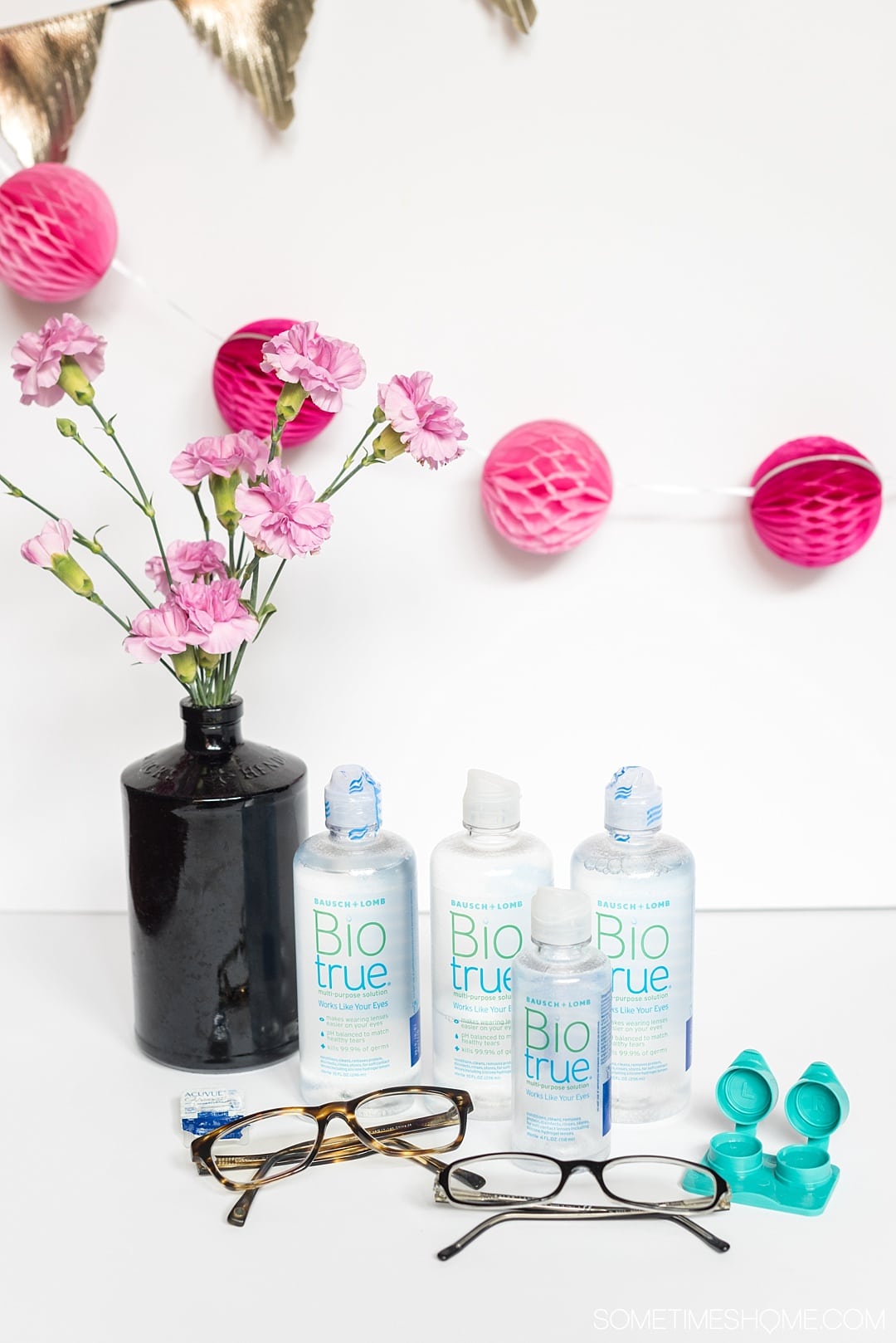
Cost
I estimated Lasik would cost between $4,000 and $8,000 for both eyes. This was based on what I heard from friends and family who had it done. This was historically prohibitive for me.
I was living paycheck to paycheck when I worked and lived in Orlando, Florida. When I moved to New York most of my money went towards rent, my social life (what's the point of living in NYC if you can't experience it?) and, most importantly, building my photography business. Then I went full time into my photography business and needed all my funds to either put back into my growing business, pay bills (including self-employed health insurance, which is astronomically expensive) or simply as a freelancer safety net.
Savings
There is a FLIP SIDE of cost though. Looking ahead to many more years of ordering contacts, buying saline and assorted drops, etc, I examined the cost benefits of having Lasik. The thought of my contacts routine never ending was haunting. If there was a way to fix it and I could afford it with time and money, why not?
Here's what I realized: Lasik Saves Money in the Long Run
I'm not 100% sure of the money I'll save over time since I cannot predict inflation, potential future rises in contact costs, and what glasses updates I would have needed for lens prescription changes over the years (nor can I predict if or when I'll need glasses again, hopefully just reading ones) but here is some quick math (please note I do not have vision insurance):
- $208/year: 1 box of contacts lasts me six weeks, or one and a half months. (I wore 2-week disposable, Acuvue Oasys contacts in both eyes, same prescription, -4.25.): $26 per box (8 boxes per year)
- $120/year: 1 new 2-pack box of contact solution approximately once every 3 months: $20 (4 boxes a year)
- $100/year: Contact lens fitting, approximate cost per annual visit
That's $428 per year.
Let's say I wear contacts another 20 years. $428 in expenses per year for the next 20 years is $8,560.00. WHOA.
And that's being conservative! It's likely I'd be wearing them another 30 years, as I'm only 35 at the moment. Another 30 years of contacts is $12,840.
Even if you subtract the cost of Lasik, I'll STILL save more than $4,500 over time. I will still end in the black, as they say. (Read on for exactly what my Lasik surgery cost.)
When I examined the costs savings, getting Lasik was a no-brainer for a few thousand dollars.
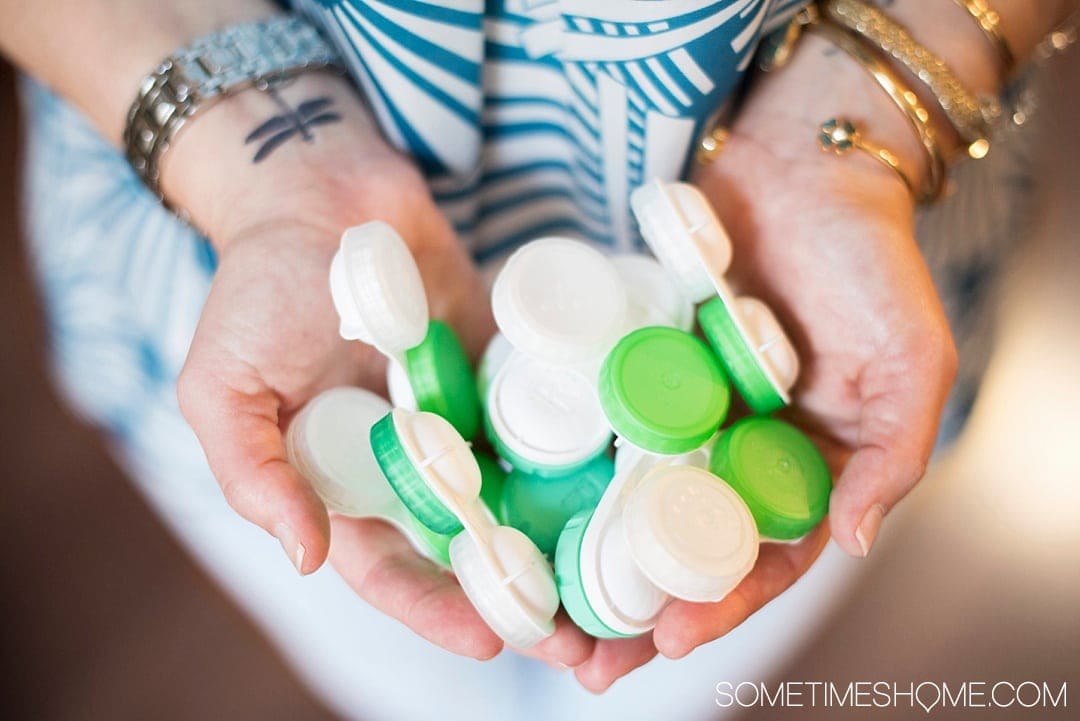
(The photo above is almost all the contact cases I had in my home. Yes, I had that many cases scattered about my apartment! Finding them to pop in a “donation” bag was like a post-Lasik celebratory scavenger hunt!)
Finding the Right Doctor
I didn't know where to start in my quest for the perfect Lasik doctor. It seemed too important to Google so I steered clear of online search engines. (It was EYE SURGERY after all – not deciding where to get dinner that evening via Yelp.)
I ended up asking my usual ophthalmologist for his recommendation during a contact lens fitting appointment one September. He opened a book (a directory, of sorts, of North Carolina eye doctors and their specialties) and pointed out two doctors, both part of Duke Eye Center.
(I spend a huge chunk of my time in Raleigh, North Carolina. Duke University is located in Durham, 30 minutes away from my home, and has a reputable hospital.)
Then 10 months passed. I figured what was the point in calling until I was ready to proceed? Eventually, the time came…and here we are!
As a woman, it was important to me to support another woman professional. Thus between the two options presented I started with the female specialist: Dr. Preeya Gupta.
I Googled her and read her credentials: she went to an incredible university, uses the latest surgical technology, and specializes in areas of ophthalmology with words I can't even pronounce.
Did I mention she won a prestigious award for outstanding surgical skills and has been practicing for well over a decade? (Do you want a newbie doctor performing eye surgery on you? Me neither.)
I picked up the phone to call her office. Luckily I was able to get a consultation appointment for the next week.
Here we are in a photo I asked her to take for this post, after my third or so follow-up appointment. She was sweet to oblige!
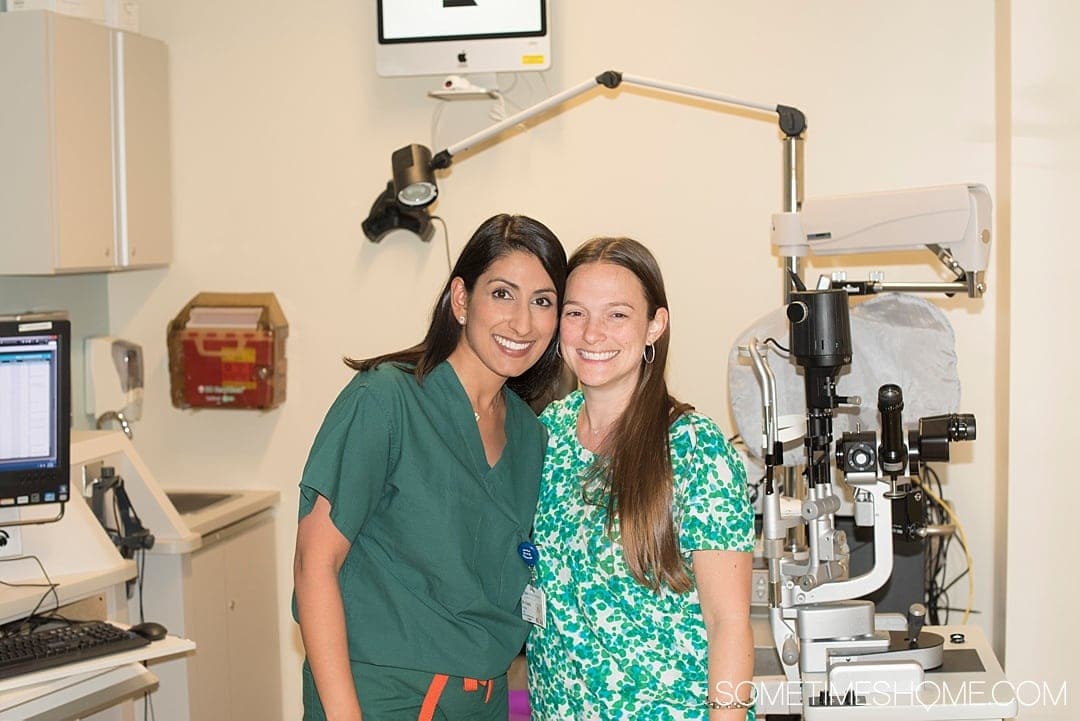
If you ensure you do ONE THING correctly in this entire process FIND THE RIGHT DOCTOR, even if you have to go to multiple consultations to do so. I'm so beyond-words grateful and proud I chose Dr. Preeya Gupta, and Duke Eye Center. With this choice I had:
- A leading eye facility
- A very reputable university (which always equates to superior institutions across the board, including its associated hospitals)
- A prominent doctor with amazing credentials
My confidence in Dr. Gupta ended up being key in my consultation and especially post-op care.
She is no longer with Duke Eye Center. I believe that she chose to go the route of a private practice. However, the point still stands: find an outstanding doctor with credentials you can trust and a personality you're comfortable with.
Consultation
I had a lengthy consultation at Duke Eye Center. This was specifically to determine if I was a candidate for the procedure. Over the years, friends had told me the only real requirement for candidacy for a Lasik eye procedure was if my eyeglasses or contacts prescription hadn't changed much over the years.
The truth was that it seems while this is a factor, it isn't nearly as important as your cornea's health.
It was deemed I was a good candidate after a lot of tests that day (yay!). They examined the health of my cornea including its thickness and strength, and pressure in my eyes. (Yes, there's an optimal internal eye pressure! Who knew?)
This are just a few tests I endured, whose purposes I was aware of. All of this was done with simple tests where I mostly had to look into a machine while a tech did the work. The last two tests were 1) an eye chart test to confirm my prescription and 2) dilation of my pupils to look inside my eyes to further determine my eyes health.
The consultation was free, which was a seller for me. If I wasn't a candidate then I had lost nothing in the process to find out, right?
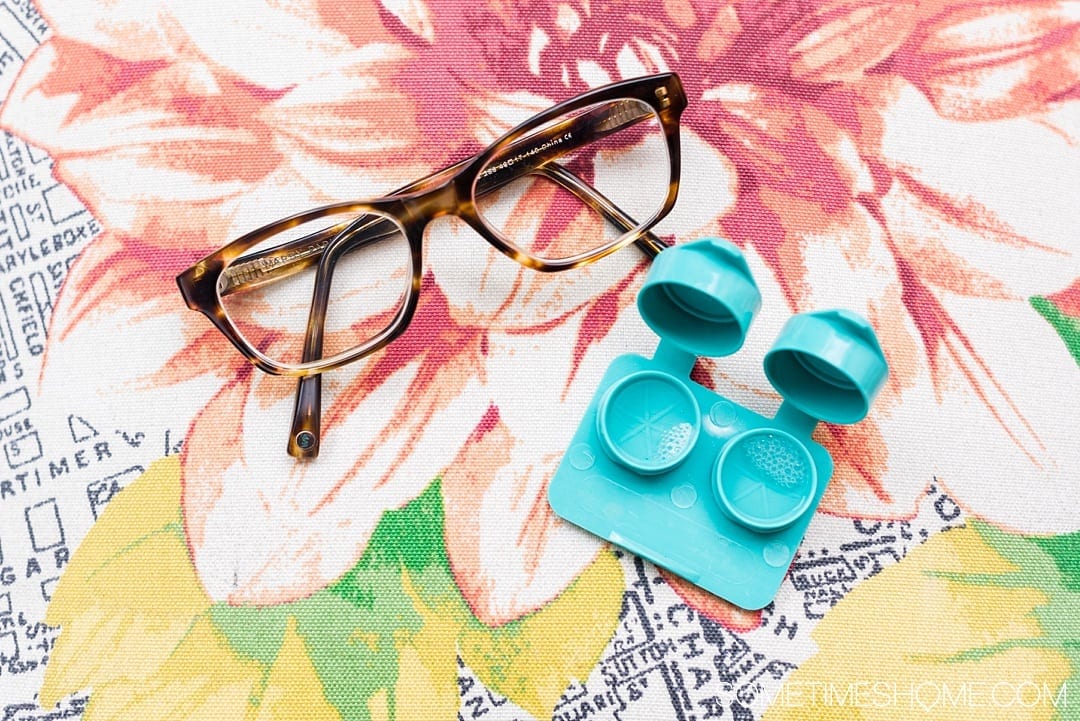
The REAL moment I knew this was the eye center and doctor for me was at the very end of the appointment when Dr. Gupta walked into the room. I had been nervous driving to my consultation (I'm not sure why as it was only a consultation) and was anxiously awaiting a verdict regarding my candidacy.
As soon as she walked in the room it was like a calm washed over me. She had such a wonderful presence, approachable professionalism, and nurturing manner; it was easy to know I was in good hands. She was smiley, confident, made eye-contact with me (all the Seven Habits of Highly Effective People, ya know?) and I knew I was in great hands.
We discussed the timeline for the procedure and I asked, “How soon can I get on the calendar?” She said I couldn't wear contacts for two weeks beforehand so I could, from that day, have the procedure done two weeks from our consultation. I was then brought to a nurse's office who was in charge of informing me of:
- Scheduling
- Pre-procedure eye care
- Cost
*Note if you're not a good candidate for Lasik because you have a thinner cornea, there's a different procedure called “PRK” (Photorefractive Keratectomy). That may be the right fit for you! I've also heard several other factors may make you a poor candidate from age, to near-sidedness, to astigmatism.
I'm not a doctor and I'm not giving you the entire rundown of what makes someone a good or bad candidate for Lasik. I'm simply sharing what my experience and knowledge.*
Exact Cost of My Lasik Eye Surgery Procedure
I had been through three hours of tests and conversations in my consultation and still didn't know what Lasik was going to cost!
I walked into the nurse's office and was slightly worried to ask the million dollar question: WHAT DOES THIS COST? Can I afford it? To my delight it was on the low-end of what I expected.
The surgery cost $3,900 “all in.”
The cost was inclusive of:
- The procedure for both eyes (I had BOTH eyes done whereas sometimes people only need Lasik in one eye. It depends on your prescription.)
- Valium pill I was offered right before the procedure and opted to take to calm my nerves
- Taxes
- Follow up appointments for one year
- Any “tweaks” (if I needed a follow up procedure to correct any vision issues) for one year
It excluded prescriptions and products I would need for post-op eye care at home.
I incurred additional costs for medication I needed before and after the procedure. The total ended up being about $100 to $200 and insurance partially covered the cost of the drugs. They included:
- Eye drops (both prescribed and over the counter)
- Assorted steroids (prescribed steroid drops, then extra pills and an ointment I had to use due to a reaction to the procedure)
All in for me, not just for Duke Eye Center, it ended up costing between $4,100 and $4,200.
Travel Perks!
I was able to charge the Lasik to my Starwood American Express, which was a great perk! What could have been better than getting rewarded for travel with my Lasik eye procedure? (Please note I don't recommend running up credit card debt. If you can't pay off your credit card at the end of each month consider paying for Lasik another way.)
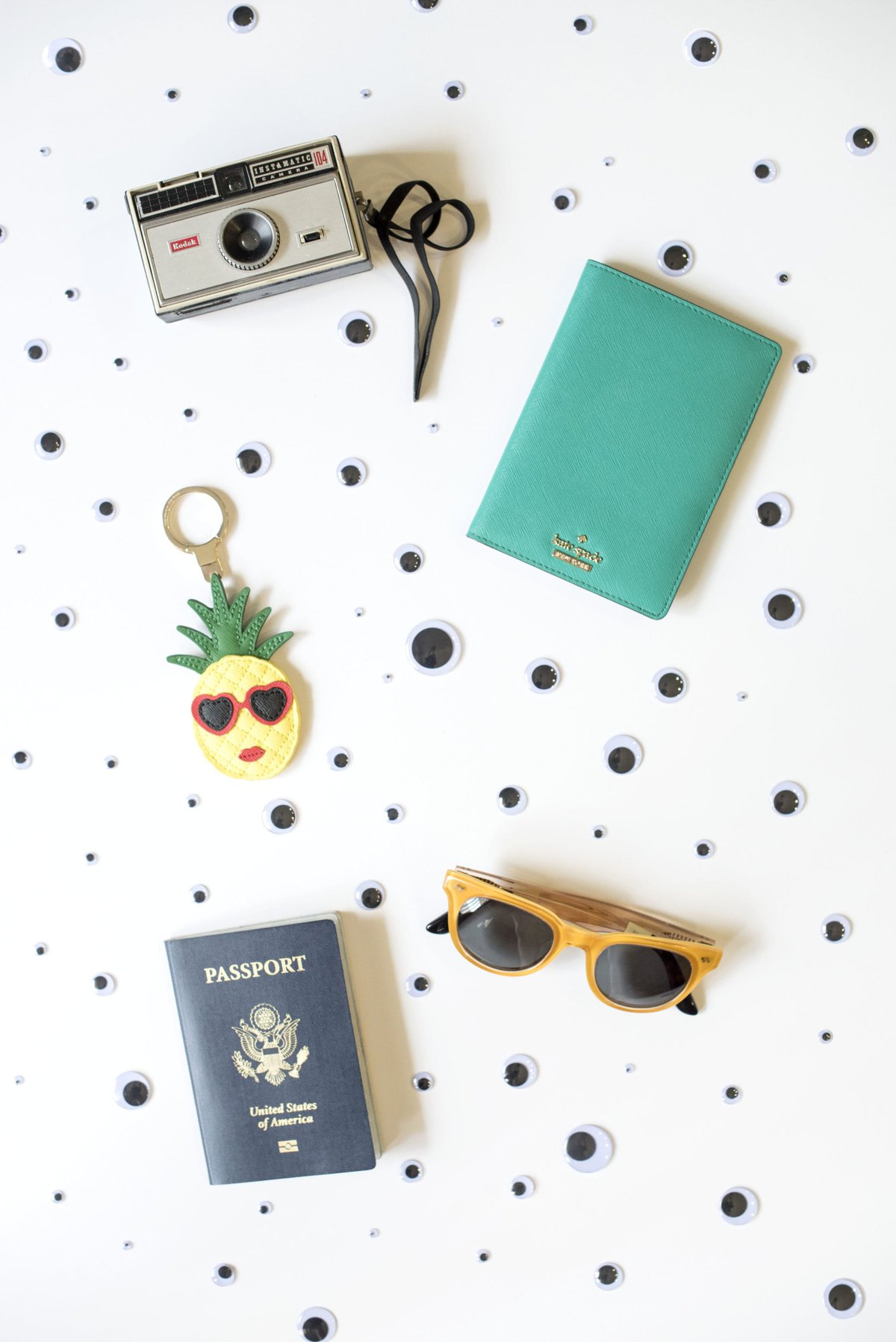
Can You Somehow Save Money on the Procedure?
I didn't ask about payment plans but if you feel you can't afford it all in one lump sum there's nothing wrong with inquiring about a financial plan. (This wouldn't save you money but perhaps it would make the cost more digestible.)
Additionally, I didn't go through insurance at all. It was elective surgery, which meant my insurance would not cover it. However, ask your insurance company if they cover any cost of it, whatsoever. The worst they can say is no.
This price was that of the doctor and facility I chose. Lasik eye surgery cost will likely vary based on where you get it done. This is NOT something I would ever skimp on. (Don't skimp on good doctors or good tattoo artists!)
I assume there is a correlation between cost of living and cost of surgery in any given area – a friend had the procedure done in NYC and paid a bit more for it – but I'm not entirely positive. Prices vary everywhere you go from the cost of a cup of coffee to Lasik eye surgery. ‘Tis the way of the world!
I will caution against getting the procedure done far away from where you live just to save money, if that is a clever thought that has crossed your mind. This is because of post-op appointments.
It was invaluable for me to be able to visit my doctor every other day after my procedure. I couldn't have known at the time I scheduled Lasik I would need to see her so often. Yet, in the end it was what transpired. (I had a bit of a unique inflammation that required increased post-op visits. Read on.) I can't imagine how I would have visited the doctor again and again if I didn't live near her office locations.
Questions to Ask Before Surgery
I truthfully didn't ask many questions before surgery. I thought of a few questions before I met the doctor but as soon as she walked into the room my instinct to trust her switched on and, with that, my questions washed away. Dr. Gupta and the staff at Duke Eye Center were incredible.
I did, however, ask a few questions while I was there. I also ended up leaving and thinking of more questions so I called a few days later to have them answered. They included:
- Does the cost include EVERYTHING? What extra costs will I incur? (For instance, I made sure the valium pill and taxes were included in the price, not an extra bill I'd see days later. I've heard stories of hospitals charging $$$ for two Ibuprofen during a hospital stay. I wasn't about to go down that slippery slope without being informed and aware of any costs I may see a charge for later on.)
- Can I use a car service to get home? Does a family member or trusted friend HAVE TO be with me? (The answer was no, I could Uber or Lyft home…and yes, you need a friend or family member to drive you home. You cannot drive on Valium. It's like you're drunk.)
- When will I be able to see afterwards? (Immediately!)
- How long does the procedure take? (20 minutes)
- What if I can't keep my eye open longer than 5 seconds? (They tape the eye open so it's nearly impossible to close it.)
I never Googled “Lasik.” Not while I was looking for a doctor (I only Googled her after she was recommended), not to see how the procedure was done, or what questions to ask.
I didn't want to get into the nitty gritty of it and make myself MORE nervous. So while I was prepared with the answers to the questions I asked above and ensured I had selected the best doctor, I wasn't armed with anything else. Just what the office prepped me for.
If you have a doctor you trust in your gut you shouldn't really have to ask many other questions. That's just my two cents.
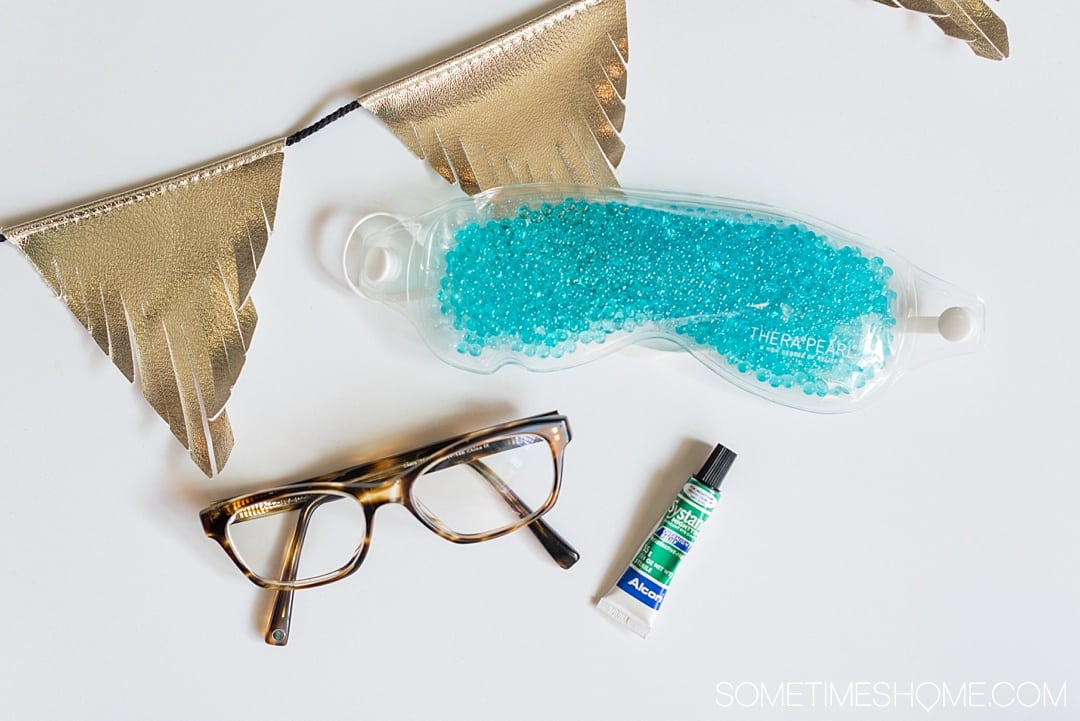
Preparations for My Lasik Eye Surgery Procedure
I scheduled my procedure for two weeks after my consultation, which was the earliest I could have it done. (This is because you need to be contact-free for two weeks to prep your eyes for Lasik. The shape of your eyes are affected by contacts and they have to go back to normal for the procedure.)
I walked out of the consultation with an appointment and instruction for what to do for the next 14 days:
- Wear glasses, only. (Absolutely no contacts! If your routine is to put your contacts in each morning, I suggest moving them elsewhere or throwing them out so you don't accidentally put them in.)
- Warm compress on my eyes twice a day: once in the morning and once in the evening. Luckily I already had a Thera Pearl Eye Mask at home and it was perfect for this! (It's a great thing to have at home anyway. It's a nice relaxation mask warm or great cold if you have a headache.)
- Apply eye ointment each night. I bought Systane preservative-free nighttime ointment as instructed. It was a bit odd to apply since it's the consistency of Neosporin and you put it in your eye but you get used to it. Here's how to do it: simply lower your lower-eyelid, put 1/4 of an inch of ointment in, and go to bed. (Your vision's slightly blurry from the gel after application but only for a few minutes.)
Easily Shop for Your Lasik Care Items
In my personal preparations, I also made sure I didn't have anything “important” on the calendar for at least a week and a half after surgery. This included being free and clear of things like important work meetings, anything I would have wanted to wear makeup to 😉 and, as a photographer, no photoshoots.
If you have a job where you have any sort of boss or supervisor I would recommend a conversation with him or her ahead of time regarding your Lasik eye surgery procedure. You can go into work the next day, but you'll have to leave for follow up appointments.
Also, in the chance you need extra care, it will be comforting to know he or she is supportive and has already been made aware of the situation of why you may have to miss work, arrive late or leave early.
Operation Day
There's two recommendations I have for the day of surgery, before you go in for your procedure:
- Wear comfortable clothes: I recommend wearing something comfortable to surgery that would also be convenient to fall asleep in later. I wore leggings and a lose fitting t-shirt I could easily pull over my head, if need be, without touching my face. My hair was braided, which made it a lot easier to put into the hair net. I chose to wear socks and shoes (not sandals) and a sweatshirt because I'm typically cold. Nothing says “uncomfortable” to me like the thought of my toes or arms being cold in an operating room during Lasik.
- Shower: You cannot shower for about 24 hours after the procedure to keep your eyes clear of the water. Thus you should shower before your procedure, day of.
Experiencing the Actual Lasik Eye Surgery Procedure
The number one question I get asked about Lasik when I tell people I had it is: DOES IT HURT? The answer is no! Truthfully the Lasik procedure is the easiest part of the entire thing!
I arrived to the eye center where my Lasik eye surgery procedure was done, in an office. (It was not at a hospital. It's that low key.) We only had to wait a few minutes before being called in by a nurse.
Dan took a seat in the eye examination room (exactly where you would have your vision checked as if for glasses) while a nurse named Merritt took me to another room to check a simple, vital eye stat.
It was at this point I said to Merritt, “I'm nervous.” I wasn't at an “I'm going to puke or pass out,” stage of nerves nor did I ever reach that. I was simply a tad nervous.
She said, “95% of this procedure is choosing a good doctor which you've already done. And the other 5% is patient cooperation. If we ask you to look a certain way during a certain time simply do that and you'll be fine! And if you look away, know the machine turns off for safety reasons.” Those few sentences made the nerves go away and I was good to go!
We walked back to the examination room where Dan was waiting. Merritt checked me for more vision info and made some notes for the doctor. Dr. Gupta walked in to say hello with a fellowship doctor that was going to be watching the surgery. We had a brief conversation and she took a marker to place two dots on my head, one above each eyebrow. Then she left.
Another nurse, named Lori, came into the exam room. She was in charge of:
- Taking my blood pressure
- Going over post-op eye care (read below) and handing me a goody bag with some refreshing eye drops, a stress ball (squeeze the ball instead of your eyes, if need be) and two pairs of glasses (one shaded, one clear)
- Administering the valium (aka handing it to me with water to swallow)
- Giving me stylish accessories to wear during the procedure
I was physically prepped with a shower-cap type hair net, gauze near my ears, and booties over my shoes. That was it! The gauze were just in case eye-drops rolled down my face, towards my ears during Lasik.
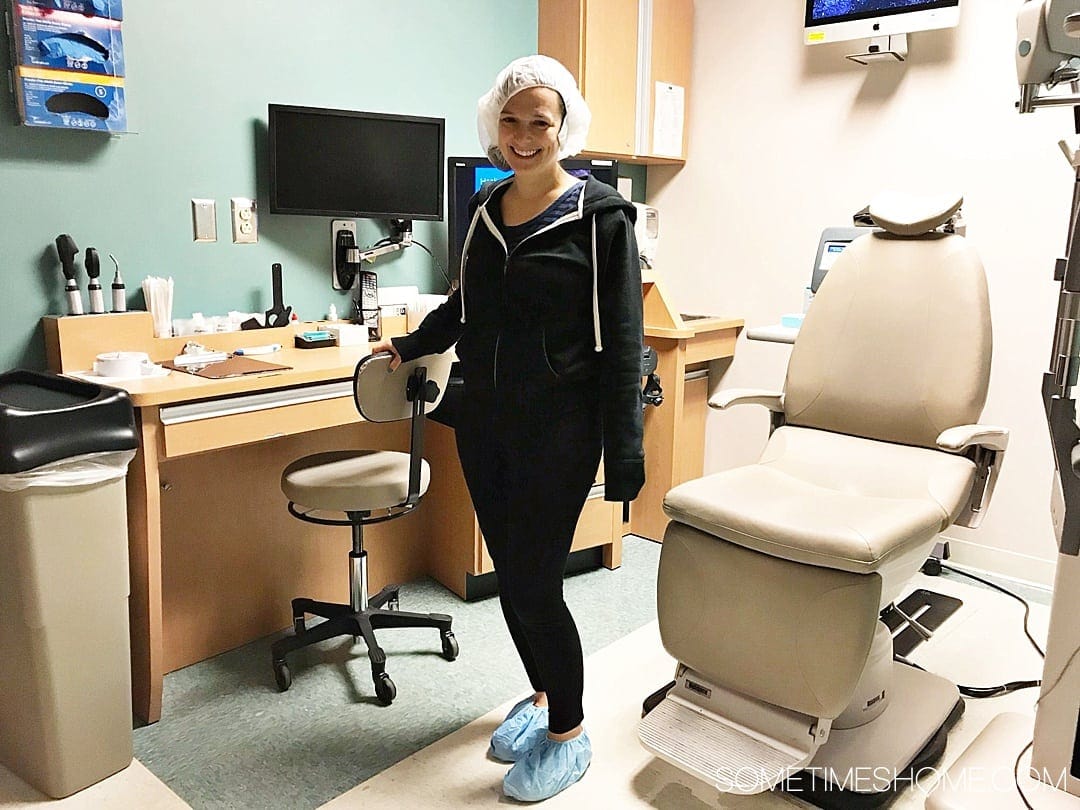
The valium started to kick in within about 15 minutes. I had never taken one prior to this but when I was told it was an option during my consultation I was in.
They make it available to you to help calm any nerves (conscious or subconscious) and it does just that. If you've never had one, it feels like you've had about two or three cocktails without the side-effects and nausea of alcohol. 🙂
I kissed Dan goodbye and was taken into the Lasik operating room. Merritt instructed me to lay down on a cushioned operating bed where I could see the very large machine before me. (It's not intimidating – it's just large!)
The ENTIRE procedure took less than 10 minutes per eye. Here's what I remember (and YES you have to be awake during the procedure):
- Numbing drops were squeezed into both eyes. They're SO good and fast-acting you don't feel anything on your eye after that.
- She started Lasik on my right eye. I believe this is because it's my dominant eye (the easiest way to know your dominant eye is which one you keep open to look into a camera) though perhaps there was another reason she started with it.
- She taped my left eye closed – the eye not being worked. My right eye was taped open.
- There was a surgical ring of some sort placed around my right eye. Again, I haven't Googled this and I was the one being worked on, so I didn't have a bystander's view of what was going on. You feel pressure around your eyeball and eye socket but again, it's a doctor doing it not some kid in a playground. So all is good. No need to freak out. Plus: valium.
- I was told to focus on a small, pin-hole size light about six inches above my eye (if that far). Three things were my guide the entire fast procedure: the blinking amber light, Dr. Gupta and nurse Merritt.
- Things went a little blurry. Dr. Gupta was talking me through it; her narration was so comforting, assuring me everything was normal and going well. It kind of looks like lenses are being placed in front of your eye like in an eye exam. You know when your eye doctor or tech says, “What is clearer? Number one or number two? One…? Or two…?” and he or she flips between lenses in the eye contraption? That's kind of what it looked like while Lasik was going on. But they don't ask your opinion – they just say “Things may be blurry…”
- At some point Dr. Gupta asked me to look somewhere and I said, “Is my eye even open? I can't see.” She forewarned me it's completely normal for my vision to go black or blank for a few seconds during the procedure. Thus I wasn't freaking out or alarmed when this happened. She simply said my eye was open and I was doing well and that was that. I mention it because if it happens to you don't freak out! (The valium has you so mellow it's difficult to freak out in that state anyway.)
- I heard a laser clicking during the next and final step of the procedure. I could faintly smell a sort of burning. It wasn't grotesque – just mild and recognizable. I got the impression this was the most important part of the procedure. It really helped that Merritt counted down from 10 seconds so I knew when it would be done, thus relieving me of any psychological pressure to keep focusing on that blinking amber light. And boom! Done!
- Perhaps there was one step in between this where Dr. Gupta made sure all was good with my cornea back in place but I don't quite recall.
- Repeat on my left eye.
- Merritt helped lift me from the bed after the procedure was complete for both eyes and asked, “Can you see?!” with a smile on her face. I thought, “Yeah, I can…but what just happened?” Instead, I quizzically replied, “Yes?” I didn't feel like I was “healed” per se. It was kind of like I just woke up from a dream and I was a little confused and groggy. 🙂 But her smile and enthusiasm after the procedure made me smile too!
Can you believe it? That's it!
She put my complimentary sunglasses on and raced me into the waiting room. She instructed Dan to get us home before the potential burning in my eyes started.
Someone asked if I had both eyes done at once or one then the other later on. Both were done at the same time. I'm not sure what the benefit would be to have them done at different times – if you have the choice I don't see a reason why you shouldn't have them done together.
Recovery
The recovery time truly varies from person to person. I liken it to how everyone's skin heals differently after a deep cut. Some people scar a little, some a lot and others hardly show signs of an injury.
After I was reunited with Dan he drove us to our apartment. He worked from home for the day just in case I needed assistance or in case of emergency – but I pretty much just slept.
I slept the whole drive home and got into bed as soon as I walked in the door. Again, I didn't need to change because I was already wearing comfy clothes. That made it very simple to just slip on my fancy clear sleep-goggles I was given at the doctor's office in my goody bag and nap. (See photo below.)
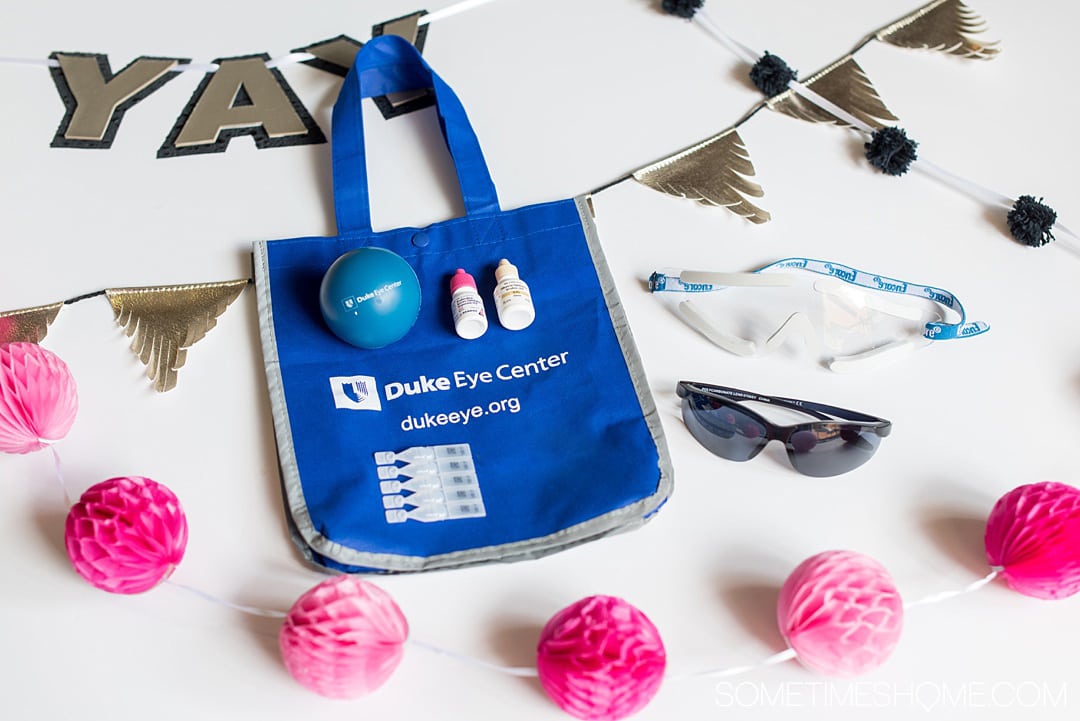
I started my post Lasik eye care almost immediately. I didn't really experience the burning Merritt said may happen; I'm sure it varies from patient to patient. It certainly burned when I put prescription eye drops in but I think I slept through the worst of it.
My post Lasik eye surgery procedure instructions included:
- One day without showering
- No squeezing, hard squinting, or rubbing of your eyes for one full week
- Four nights of wearing protective goggles to bed (I really liked them because they made me feel secure in my eye protection the nights after my procedure)
- No makeup for seven days
- Stay free of dirty environments for one week
- No swimming or sports until directed by your doctor
- Refrain from driving until permitted by your doctor (I was given the green light to drive after my post-op appointment checkup the next day)
My post Lasik eye drop care and regimen included:
- Antibiotics (prescription): called Ofloxacin
- Steroids (prescription): called Prednisolone
- Preservative Free, Artificial Tears (over the counter): I loved the Refresh Optive, Single Use, Preservative-Free Lubricant Eye Drops. They were a LIFESAVER. I used one tube per hour for about a week, then less and less as days progressed afterwards as needed. I wish I bought the bigger box from the get go to save money in the long run because I kept buying more and more boxes! It's better to buy a lot from the get-go; you'll need them.
Lasik healing time and experience depend on the individual. I imagined it would be easy-breezy from friends who had it and raved about the results. Yet they either simply didn't get into the nitty gritty of recovery or they had an easier time than I did.
Possible side-effects I was informed of included:
- Very dry eyes
- Possibility of blood vessels popping in your eye as a result of the procedure
- Light sensitivity
- Swollen eyelids
- A “halo” effect in vision (could be temporary or longer lasting)
I personally experienced:
- Very dry eyes (which I later found out was partially because the prescription drops dry out your eyes a little)
- Pain and discomfort in both eyes
- Unexpected extra inflammation
- Light sensitivity
- I had visible redness surround one eye but not noticeable popped blood vessels
The inflammation wasn't visible to the naked eye, whatsoever. Though I definitely felt it and, after subsequent additional and unexpected doctor visits in the days after surgery, I know it was certainly visible under a microscope.
As a result of my eye inflammation and discomfort I was put on an aggressive steroid schedule and prescribed steroid pills. I was also prescribed an additional ointment that I used each night before bed.
This would result in me having to purchase two additional bottles of the steroid eye drops, Prednisolone, and using drops for about four weeks longer than the average Lasik patient. (It's a little unfortunate I needed so much Prednisolone because it was the most expensive prescription I had to purchase but I wasn't about to refuse doctor's orders to heal my eyes! I was going to do whatever it took. What's more important than your health…and love?)
Here is a visual of the prescriptions:
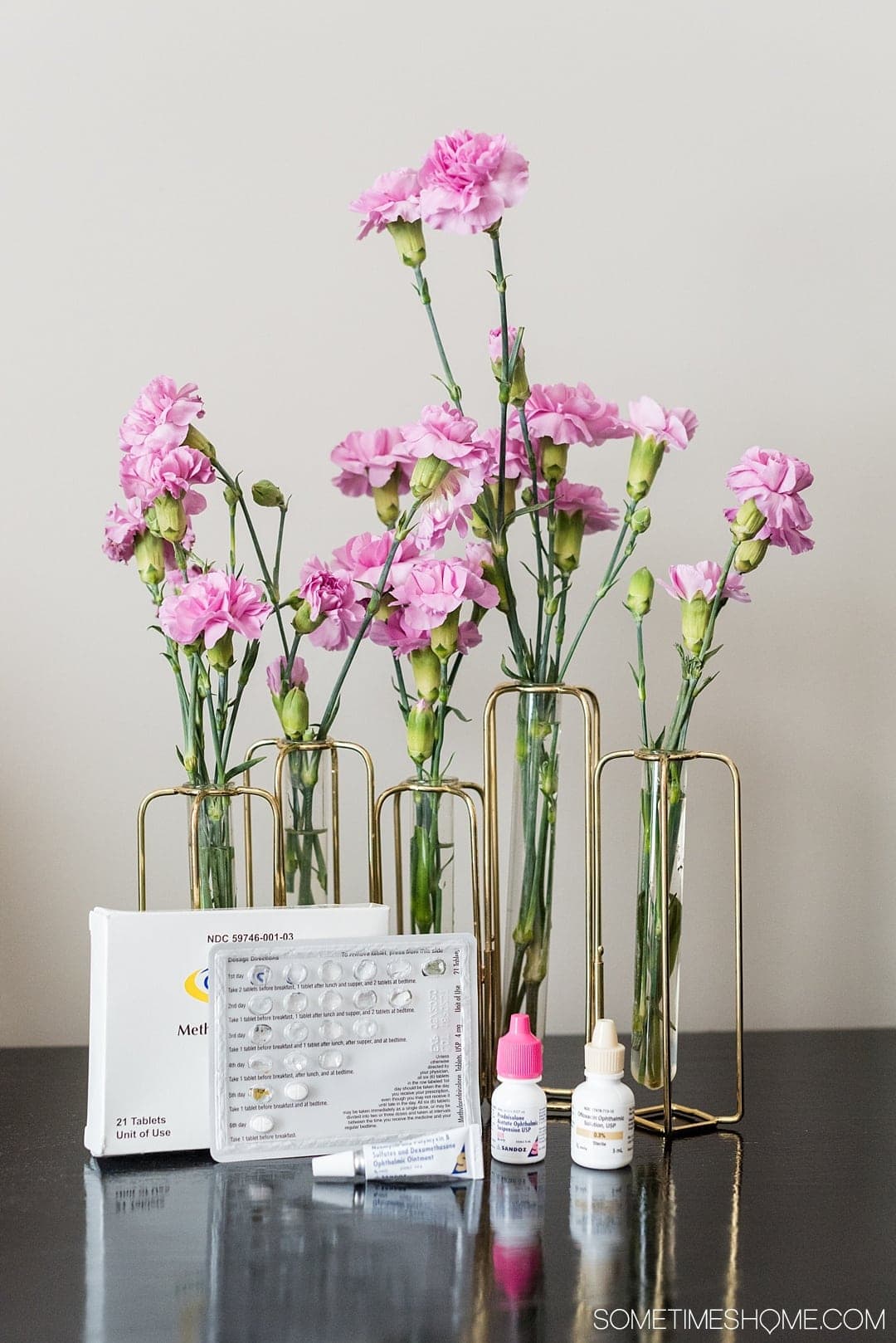
There were also days that I simply felt like I couldn't keep my eyes open anymore. I wasn't physically tired in my entire body, just my eyes. As if my eyes were saying, “Okay, we're done for today. We're going to close.” And the best thing for me to do was stop my days activities around 9:30pm and go to bed.
It was like I was exhausted from the simple act of SEEING all day. But then I'd remind myself I just had a significant procedure done and my body was working overtime to heal itself.
When I'd get into bed, and put the ointment in my eyes and put on my clear goggles…it felt SO RELIEVING. My eyes were grateful. Thus, my mind was too.
If you're curious about the general discomfort in my eyes the days after surgery the best way I can describe it is it felt like I had my contacts in inside out. All the time. Or the dryness is liken to feeling like you can't wait to take out your contacts because they're that dry…then you remember you don't have contacts in.
Sometimes it almost felt like I had a very coarse, large eyelash in my eye or three fine grains of sand during the days I was dealing with extra inflammation issues. Again, this was my experience. If you ask three different people they may have different experiences to share.
The difference between those first three to five days after my Lasik eye surgery procedure and seven days was astounding. What a difference a full week made!
When I saw her for another check up at the one week mark I shared I finally felt like I was over the “hump” of the aftermath of the procedure. We both smiled! (And she could clinically see I was, in fact, 100 times better under a microscope in terms of healing. I think the oral steroid she prescribed made a huge difference.)
Over a year and a half later I definitely still get dry eyes, mostly at night. I simply keep eye drops on my bedside table and put them in as needed if I wake up. Otherwise I never need them.
Ask Your Post-Op Questions
No question is too silly. If you've chosen the right doctor and team they won't make you feel like questions are stupid. So if you have questions, ask.
I personally asked if the pain would ever go away. The first week of healing felt like WEEKS because of the complication. But after the week passed and it got a LOT better it was like, “Oh that was just a week!” I also asked if the dryness in my eyes was potentially permanent. Dr. Gupta assured me the pain would go away and the dryness was temporary.
Was This a Miracle?
My initial thought is, “Of course.” Modern medicine is a bit “miraculous” and awe-inspiring. I whole-heartedly believe in the advancement of science and I didn't mind, one bit, when fellows at Duke University looked at my eyes during my follow up appointments because we always need more great doctors.
Do I feel like a “miracle” happened in the biblical sense? I favor science over religion so, no, I don't think Lasik is a miracle. Truthfully, I more so feel like some sort of robot in a Steven Spielberg movie who had new eyes put in. To be clear, I didn't get new eyes. The shape of my eyes was simply resculpted with a laser once my cornea was temporarily moved for a few seconds. Then it was put back together and voila – I CAN SEE!
As the days passed after surgery and I got used to my perfect vision, I was increasingly happy with the results. (My vision is now 20/20, bordering on 20/15 some days.) I can't believe I didn't do it sooner but, as an eternal optimist, I am so glad I did it when I did and didn't delay longer.
If I can give you another solid piece of advice if you are reading this and you're on the fence about getting Lasik: DO NOT WAIT. The longer you wait to do it the less years you'll be able to reap the benefits of the procedure.
In the Long Term…
My doctor made it clear I may need reading glasses in my 40s, which isn't far away. It's unlikely your eyes will be forever healed of poor vision in your lifetime, no matter when you get Lasik. (But again, read my solid piece of advice above.) Also, it's important to note eyes can regress past the point of simply needing reading glasses post-Lasik too.
A friend of mine had the procedure done nearly 12 years ago and needs to wear corrective lenses again. Results vary based on many things, including technology, doctor, person-dependent healing and his or her particular eyes, etc. Too many factors would affect different people and it's hard to make that call on an “unknown” future. That withstanding, I'm still glad I had Lasik for however many years it lasts. (And I hope it's many.)
I LOVE getting up in the evening and being able to clearly see my way to the bathroom. It's so freaking cool to me I can spontaneously fall asleep on the couch for a little nap without having to wake up and peel contacts off my eyeballs as a result. And I cannot wait to take a long flight where I can simply doze off and not have to worry about the same.
If all of this talk of self-improvement and Lasik benefits has you excited, also check out:
- Why I Started to Travel Solo and You Should Too
- What It's Like to Stay in 9 Hours Pod Hotel in Shinjuku Japan
- My Top Tip to Help You Pack in 10 Minutes Flat
Disclosure: There may be affiliate links in this post, which means we may earn a small commission for recommending our favorite eye care products to you if you click the link and proceed with a purchase. We promise we only recommend products or services we personally use and recommend.
Did you know “LASIK” is an acronym for “Laser-Assisted Stromal In-situ Keratomileusis“?
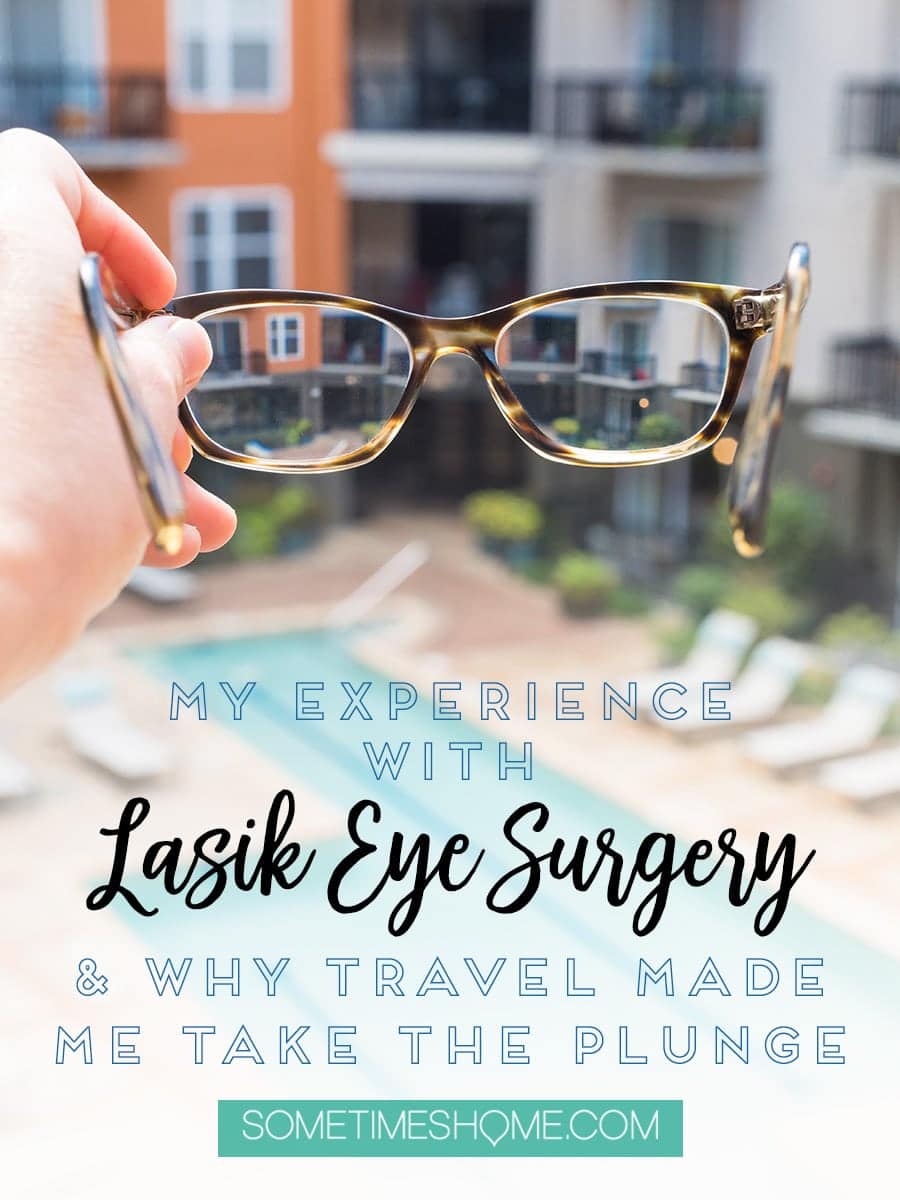
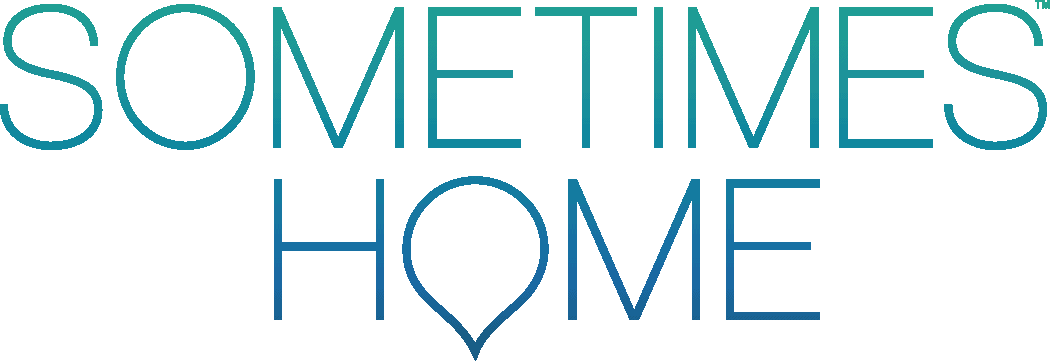

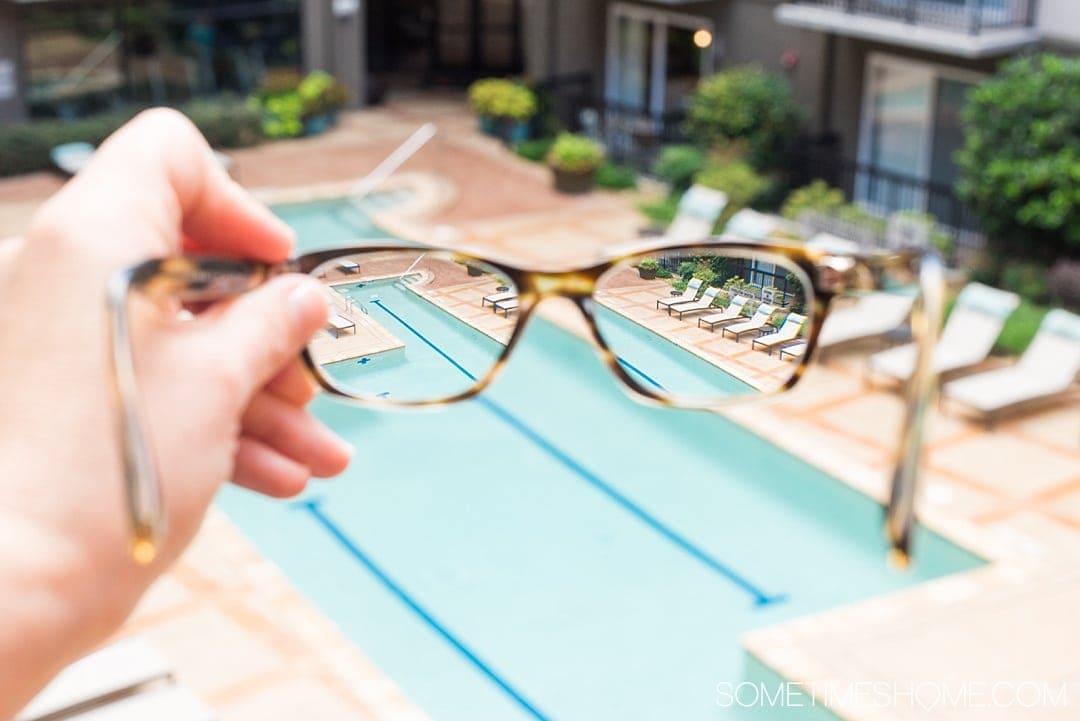
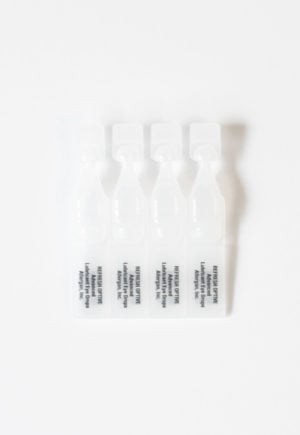
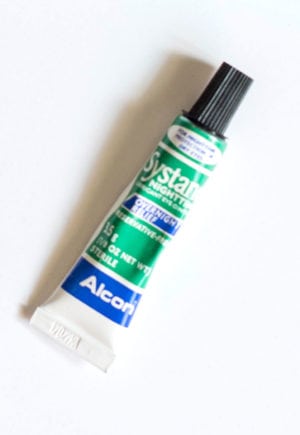
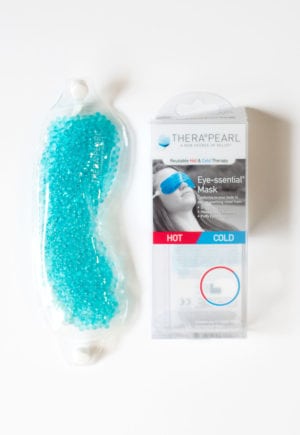
Mikkel this was SOOOO thorough and amazing to read!! Thank you for sharing your experience! <3
I LOVE hearing that, Cassi! <3 Thank you for your comment!